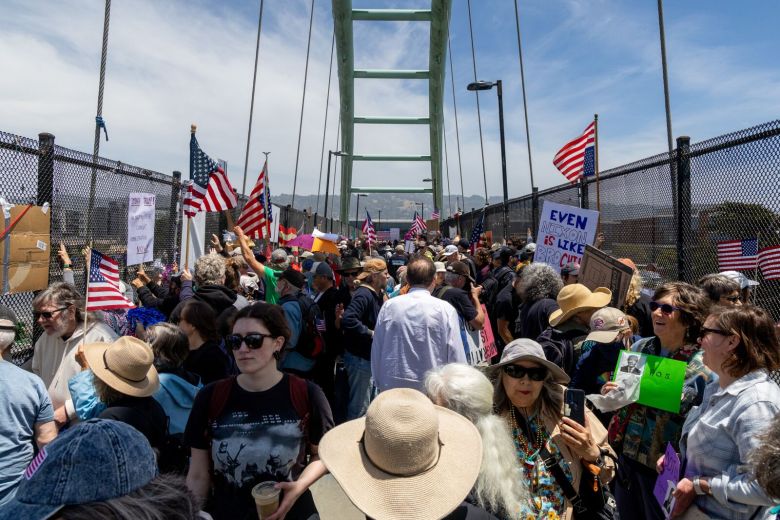 Protesters in Berkeley waved American flags and handmade signs on the I-80 overpass near Aquatic Park during the first “No Kings” protest in June. The bridge is again set to be a stage for protest on Saturday. Credit: Sara Martin/Berkeleyside
Protesters in Berkeley waved American flags and handmade signs on the I-80 overpass near Aquatic Park during the first “No Kings” protest in June. The bridge is again set to be a stage for protest on Saturday. Credit: Sara Martin/Berkeleyside
Huge crowds of protesters are expected Saturday in Berkeley, Oakland and thousands of places around the U.S. in opposition to what some are characterizing as increasingly authoritarian practices by President Donald Trump.
It’s the second “No Kings” protest and third mass movement against the administration this year, and it comes amid an intensifying conflict between federal law enforcement and protesters nationwide.
In June, an estimated 4 million people showed up at nearly 2,000 protests across the country, including tens of thousands in the East Bay and more than 140,000 across the Bay Area. In Berkeley, protesters gathered at the I-80 overpass at the north end of Aquatic Park, waving American flags and hoisting handmade signs as traffic zipped by below.
On Saturday, protests are planned for more than 2,500 locations nationwide. Some organizers in the Bay Area have said they expect even larger crowds this time around.
A protest is again planned for the Berkeley overpass, from 1-3 p.m., with the Berkeley nonprofit Shark Stewards organizing people to dress up “in ocean creature costume with signs to protect endangered sharks, whales and seabirds imperiled by the President’s Executive Orders.” Protesters will also gather from 10 a.m. to 1 p.m. at Telegraph Avenue and Bancroft Way and from 11 a.m. to noon at San Pablo and University.
In Oakland, a march hosted by Indivisible East Bay, will kick off at 12:30 p.m. from Wilma Chan Park, with protesters gathering starting at 11:30 a.m. The march will end at the Lake Merritt Amphitheater, near Lake Merritt Boulevard and 12th Street, for a speech by Mayor Barbara Lee, poetry from Berkeley’s poet laureate Aya de Leon, and a performance by the Brass Liberation Orchestra at the amphitheater. The event will wrap by 2 p.m.
Some conservative politicians have condemned the protests as “Hate America” rallies, with U.S. House leaders saying the protests are meant to appease the Democratic Party’s “terrorist wing.” Others say that it represents a “patriotic” fight for First Amendment rights and that opposition to mass peaceful protest is a hallmark of authoritarian regimes.
Organizers aim to boost political engagement
Ezra Levin, a leading organizer of Saturday’s protests, said the demonstrations are a response to what he called Trump’s “crackdown on First Amendment rights.”
Levin, the co-executive director of the nonprofit Indivisible, pointed to Trump’s sweeping immigration crackdown, his unprecedented promises to use federal power to influence midterm elections, restrictions on press freedom and retribution against political opponents.
He said those steps cumulatively represented a direct threat to constitutionally protected rights.
Organizers will consider the day a success, Levin said, if people are galvanized to become more politically involved on an ongoing basis.
The last “No Kings” protest took place on June 14 in thousands of cities and towns across the country, in large part to protest a military parade in Washington that marked the Army’s 250th anniversary and coincided with Trump’s birthday. “No Kings” organizers at the time called the parade “coronation” that was symbolic of what they characterized as Trump’s growing authoritarian overreach.
Confrontations were isolated and the protests were largely peaceful.
Crackdown on protests
Trump’s crackdown against protests, especially in Democratic cities, has intensified since the June marches. He has since sent National Guard troops to Washington, D.C., and Memphis, Tenn. His efforts to deploy troops to Chicago and Portland, Oregon, have stalled in federal court. He has signaled this week that San Francisco could be the next target.
Federal immigration agents have arrested more than 1,000 people in Chicago, the nation’s third largest city, with increasingly aggressive tactics since September. Protests have been frequent and well attended in recent weeks, and have boiled over in intense clashes outside a suburban federal immigration processing center.
Berkeley leaders came together to urge protesters to remain peaceful and alert to dangers posed from the federal government’s response.
“Recent events, including the use of the military in Los Angeles, Washington, D.C., and Chicago, as well as the current threats to San Francisco and Oakland, underscore the importance of being prepared and informed,” reads a statement issued Friday from Mayor Adena Ishii, City Manager Paul Buddenhagen and Police Chief Jennifer Louis. “Additionally, there may be individuals who co-opt a peaceful protest for their own agenda; stay aware and clear of those engaged in dangerous and criminal behavior.”
The “No Kings” organizers have led numerous virtual safety trainings leading up to the protests with the help of the American Civil Liberties Union, which is listed as an official partner on the “No Kings” website.
The trainings informed viewers about their rights during protests — such as whether you are required to carry ID (you’re not in California) — and emphasized de-escalation techniques for encounters with law enforcement.
Each official protest has a safety plan, which includes designated medics and emergency meeting spots.
This story was produced by the Associated Press with reporting from Berkeleyside staff.
We know that most readers don’t get to the end of the article. But you did! To support our in-depth, rock-solid reporting, please consider making a donation to our nonprofit newsroom today. We rely on our readers — particularly the ones who read the whole story!
“*” indicates required fields
